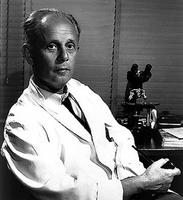
Selye, Hans
Hans Selye, endocrinologist, world-famous pioneer and popularizer of research on "biological stress" in human individuals and groups (b at Vienna, Austria 26 Jan 1907; d at Montréal 16 Oct 1982). Educated in Prague, Paris and Rome, he joined the staff of McGill in 1932. He became the first director of the Institute of Experimental Medicine and Surgery at U de M (1945) and guided its activities until his 1976 retirement. In 1977 he founded the International Institute of Stress, based in his own home.His theorizing about a General Adaptation Syndrome, based on much experimentation on rats, provoked much controversy. Briefly put, his model suggests that all stimuli are "stressors" that produce a general response of "stress" in the affected person. (Selye later claimed that he was hampered by his inadequate English and "should have called my syndrome the 'strain syndrome.'") For Selye, "stress plays some role in the development of every disease" and is "the non-specific response of the body to any demand made upon it." This process, which he called the General Adaptation Syndrome, has 3 phases: alarm, resistance and exhaustion. Failure to "cope adequately" with stressors results in and is displayed by "diseases of adaptation" (eg, high blood pressure, gastric and duodenal ulcers, various mental disorders). Later, Selye spoke of 2 major types of "stress": "pleasant or curative stress" ("eustress") and "unpleasant or disease-producing stress" ("distress"). He also had earlier flirted with the idea that an entire "nation" could experience a General Adaptation Syndrome, whereby, in a situation of mass "frustration" and insecurity, "the incidence of all stress diseases will increase."
A prolific author and lecturer, he strove to make his ideas accessible to the general public in writings such as The Stress of Life (1956; rev ed 1976); Stress Without Distress (1974), and his autobiography, The Stress of My Life (1977; 2nd ed 1979). He received many honours, including some 20 honorary degrees, and was a Companion of the Order of Canada. Selye's overly "biological" focus ignored or underestimated the role played by the person's psychology and culture in shaping and affecting the body's physiology, and his theoretical model has now been superseded by the "cognitive" models of stress and coping put forward by psychologist Richard Lazarus (U of Calif, Berkeley) and others.

 Share on Facebook
Share on Facebook Share on X
Share on X Share by Email
Share by Email Share on Google Classroom
Share on Google Classroom


